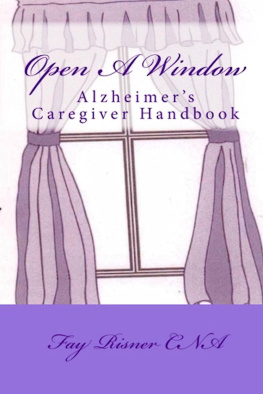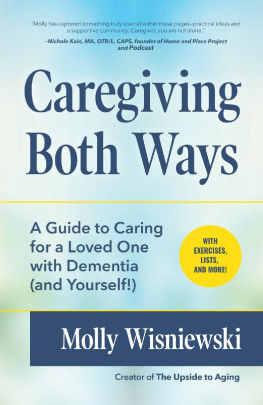Practical and profound, Take Good Care is for every adult who admits intimacy into their lives. Stories that meld with Cynthia Oranges wise and insightful narrative show how it feels to be a caregiverin all of its varied forms, with all of its rewards and challenges. This book differs from others on the subject in scope and depth, as it connects self with community and encompasses the importance of self-care, service, and nurturing compassionate children. Ultimately this book is about how to have more joy in our lives as we practice healthy care giving.
Patrick Dougherty, licensed psychologist and author of A Whole-Hearted Embrace: Finding Love at the Center of It All
To those engaged in the challenging journey of caregiving, I recommend this outstanding book without reservation. Take Good Care is abundant in wisdom, practical tools, helpful stories, andmost importantthe insightful compassion that every caregiver deserves and benefits fromstep after step, decision upon decision.
Reverend Dr. Gretchen Thompson, hospice chaplain and author of God Knows Caregiving Can Pull You Apart: 12 Ways to Keep It All Together
A deep and important look at the art of caregiving, Take Good Care moves us from care taking to care giving and shows us how to embrace our capacity to connect with others. Cynthia Oranges circle of care strategy is a brilliant application of Susan Silks Ring Theory that we as caregivers can employ when what is meant to be a loving act overwhelms us. An essential resource for those in the outer circles as well.
Harry Haroutunian, MD, former physician director, Betty Ford Center, and author of Not As Prescribed and Being Sober
Hazelden Publishing
Center City, Minnesota 55012
hazelden.org/bookstore
2017 by Cynthia Orange
All rights reserved. Published 2017.
Printed in the United States of America
Except for the handouts in the appendixes, no part of this publication, either print or electronic, may be reproduced in any form or by any means without the express written permission of the publisher. Failure to comply with these terms may expose you to legal action and damages for copyright infringement.
Names: Orange, Cynthia, author.
Title: Take good care : finding your joy in compassionate caregiving / Cynthia Orange with a foreword by Susan Allen Toth, author of no saints around here: a caregivers days.
Description: Center City, Minnesota : Hazelden Publishing, 2017. | Includes bibliographical references.
Identifiers: LCCN 2016054671 (print) | LCCN 2017005911 (ebook) | ISBN 9781616496739 (paperback) | ISBN 9781616496722 (ebook)
Subjects: LCSH: Caregivers--Psychology. | Codependency. | BISAC: SELF-HELP / Codependency. | SELF-HELP / Personal Growth / General. | FAMILY & RELATIONSHIPS / General.
Classification: LCC RA645.3 .O73 2017 (print) | LCC RA645.3 (ebook) | DDC 610--dc23
LC record available at https://lccn.loc.gov/2016054671
Editors note
Some names, details, and circumstances have been changed to protect the privacy of those mentioned in this publication.
This publication is not intended as a substitute for the advice of health care professionals.
Readers should be aware that websites listed in this work may have changed or disappeared between when this work was written and when it is read.
Alcoholics Anonymous and AA are registered trademarks of Alcoholics Anonymous World Services, Inc.
Cover design: Terri Kinne
Interior design and typesetting: Percolator Graphic Design
Developmental editor: Sid Farrar
Authors Note
The stories excerpted throughout this book are based on actual experiences, relayed to me through interviews and conversations or in response to questionnaires distributed to caregivers and care recipients and professionals who provide counseling or other help to individuals and families dealing with caregiving issues. (These questionnaires can be found in of this book.)
Unless otherwise noted, these stories are presented anonymously or the names have been changed to protect the privacy of the people involved. In some cases, some details have been changed or the stories are presented as composites to ensure anonymity.
Dedication
For my sister Diannewith love, and in memory of Lee. Thank you for trusting me to share your caregiving journey.
For my grandsons, Oskar and Quinthe kindest children I know. I love being your Meema.
For my daughter, Jessica, and son-in-law, Jeffwho continue to bring such joy, wisdom, humor, and love to my life and to our family.
And for Michael, my husband and best friendI treasure our yesterdays, embrace our todays, and welcome all our tomorrows. I love you.
Contents
Foreword: Opening the Door
When I hear the word caregiving, I think of a particular room. It held a stark metal hospital bed, a ceiling-to-floor grabbing device, a bulky recliner borrowed from hospice, a wheelchair, a card table with two chairs, a commode bravely padded in bright blue, a desk devoured by a TV set, and an ugly CD player.
For almost two years, my much-loved husband, James, felled by Parkinsons with eventual dementia, was mostly confined to this room. Although I was very fortunate to have help, I spent lots of time there too. Even now, years after his death, I can feel Jamess tight grip on my arm and count his few lurching steps from the bed to the recliner, from the recliner to the wheelchair, from the little table to the shower. Once designed as a spacious bedroom for my teenage daughter, the room soon came to seem small. Suffocatingly small.
In Take Good Care: Finding Your Joy in Compassionate Caregiving, Cynthia Orange opened up that room. She took me up the stairs and out my front door into a larger space, a caregiving community that eventually links into an even larger world. This is a world in which anyone with a sense of connection to others is a potential giver of care. Although she pays attention to those whom we ordinarily think of as caregiversa daughter looking after her aging father, a husband tending to the needs of a dying wife, parents trying to aid a child struggling with mental illnessshe expands that definition. At some point in life, she reminds us, everyone needs help.
For Cynthia, caregiving takes many forms. A caregiver might be someone who mows a lawn for a sick friend or a willing volunteer who joins a circle of care (the author usefully graphs this concept using concentric circles moving from the primary caregivers out to people playing less vital roles). In her challenging last chapter, Raising Compassionate Children and Paying It Forward, she lists specific ways parents can teach compassionate caregiving to their children. In fact, her whole book is a multipurpose teaching tool. As she explains, I also believe in my heart of hearts that care giving is an artan important skill that can be learned, practiced, refined, valued, and shared.
Note those italics: care giving, not care taking. In her first chapter, A Closer Look at Care taking, she lucidly describes the difference and warns readers how to avoid losing themselves when they (perhaps mistakenly) think they are helping. In , Balance and Boundaries, she continues this exploration. I cant imagine anyone not smiling wryly in recognition at some of her examples of how essentialand difficultit can be to set boundaries. I love this one: Does someone frequently keep you on the phone for over an hour even though youve said I have to get going or Ive only got a minute at the beginning of the conversation? After I read this, I wondered if I might learn to say, Im sorry, but I have an incoming message from Cynthia Orange, and she needs me to hang up.
Next page






